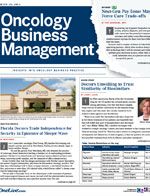Zarxio Gets a Boston Welcome
The road to becoming the first biosimilar to go on sale in the United States has been uneven for Zarxio (filgrastim-sndz), a Sandoz product for raising white blood cell counts.
OncLive Chairman,
Mike Hennessy
Being the first to do anything can be either easy or difficult, depending on the scale of the objective and the level of opposition one faces. The road to becoming the first biosimilar to go on sale in the United States has been uneven for Zarxio (filgrastim-sndz), a Sandoz product for raising white blood cell counts. It has potential, by virtue of its lower cost, to reach many who cannot currently afford the brand name equivalent.
The arrival of this product, which has already enjoyed commercial success in Europe under a different name, has been held up by legal proceedings initiated by Amgen, owner of the reigning brand Neupogen (filgrastim). Amgen objected that Sandoz’s application for marketing approval was incomplete, and the US Court of Appeals for the Federal Circuit in Washington agreed that there may be a basis to that objection. At press time, oral arguments on the case were scheduled for June 3, 2015.
It seems inevitable, however, that this delay will prove only temporary, and that Zarxio will soon become available in this country, followed by a slate of other replica drugs that Sandoz and other companies have in store. Indeed, “The biosimilars are coming!” may well be the revolutionary cry that leads to drug market rebalancing on the same order of magnitude as generics wrought. Generics—exact replicas of brand name drugs—have significantly lowered the cost of medicine, it is safe to say.
Biosimilars, on the other hand, have been successful in capturing market share in Europe, but US physicians worry that they will not be as effective or reliable as their brand name counterparts. This is because they are so complex to manufacture that minute differences exist between batches of the drugs. In the past 2 years, at least 23 states have considered legislation that would in some way regulate how these drugs are made available to patients and how much say doctors would have regarding whether biosimilars or brand name drugs are used, according to the National Conference of State Legislatures.
With a large number of major oncology drugs going off patent in the next 5 to 7 years, and with many drug companies planning their own versions of biosimilars, there is limited willingness among US oncologists to fully trust the FDA’s assurances that each biosimilar candidate will get a thorough and sufficient review before approval.
Laws governing biosimilars have already been enacted in some states, and legislative efforts have failed in many others, reflecting the diversity of opinion and the legislative muscle being exercised on all sides of this issue. In Europe, market penetration of these drugs has varied widely from country to country, serving perhaps as an indication that merely being a cheaper substitute is not a passport to acceptance. However, these drugs certainly have a foothold abroad. Zarxio, while waiting on the wings of the US stage, is currently marketed as Zarzio in 60 other countries, according to Novartis, parent company of Sandoz.
That cheaper biologics are needed in an age of soaring cancer costs is not a point that begs substantiation. It is what many would call a no-brainer. But getting to a place where Europe has already been for many a year, where biosimilars are widely used and accepted—increasingly so—seems likely to involve a process of battle and compromise that will continue long past this current Zarxio episode. Legislative debates over biosimilars are expected to play out in all 50 states.
Read all about it in this month’s Oncology Business Management.




